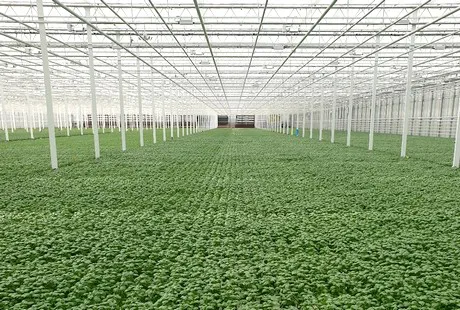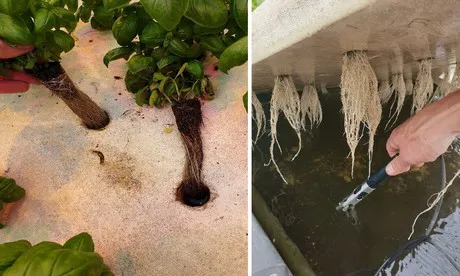De Kruidenaer, a commercial grower located in the Netherlands, operates over 20 hectares of land that includes greenhouses and open soil farming areas. The greenhouses are used to cultivate mint and basil (green, red, and Thai basil) with a deep-water culture hydroponic system, while the outdoor areas are used to grow chives, dill, rosemary, coriander, and parsley. After experiencing rapid growth since their inception in 2013, they are currently one of the leading producers of fresh basil in the Netherlands.

One of the large greenhouses at De Kruidenaer in full basil production
Owners Christ and Jacqueline Monden are passionate growers and take great pride in their greenhouse and are committed to delivering the freshest, best-tasting produce with the least amount of chemicals. One of their core principles when establishing the facility was to focus on sustainability, so they are constantly seeking innovative solutions to grow more efficiently and overcome challenges they experience.
After six years of continuous cultivation with low levels of oxygen in the cultivation ponds, the water was turbid and filled with poorly broken-down organic matter. Elevating the dissolved oxygen in the pond water with oxygen nanobubbles is a natural, chemical-free way to improve water quality and provide a healthier environment for stronger root development. When hearing about the Moleaer system and the positive impacts of oxygen nanobubbles at dozens of other greenhouses around the world, they installed one of their own. The nanobubble generator rapidly dispersed oxygen nanobubbles evenly throughout the cultivation ponds and elevated the dissolved oxygen. The Mondens saw an immediate improvement in water quality, noting that their pond water is now crystal-clear. They also saw healthier root development.
“We constructed our greenhouse in 2013 and since that time, we would continuously circulate the water, add fertilizer, control the pH, and aerate the water," says Monden. “We understand the importance of having elevated levels of dissolved oxygen to keep the water clean and promote healthy root development. When we heard about the Moleaer nanobubble generator and its ability to elevate and maintain high levels of dissolved oxygen, we were very excited to implement this technology at our facility. The nanobubble generator was easily integrated into the mixing tank that is directly connected to our water ponds, ensuring all of our plants are experiencing the benefits of oxygen nanobubbles.”

Before and after pictures showing the impact of oxygen nanobubbles on irrigation water and the resulting root health improvement
“The properties of nanobubbles are unique and radically change the way we should look at aeration, especially in horticultural applications where the limitations of conventional methods are most apparent”, says Michiel de Jong, European Director of Business Development at Moleaer.
“Nanobubbles do not rise to the surface and burst, but rather stay submerged underwater following Brownian motion. That allows us to use oxygen cost effectively to sustain high levels of dissolved oxygen throughout the entire water column. Oxygen nanobubbles will also increase the oxidation reduction potential (ORP) of the water that will promote the breakdown of residual organics. They are also effective in combating pathogens like Pythium. By sustaining high levels of dissolved oxygen and nanobubbles in the water, Pythium did not proliferate. The high oxygen transfer efficiency of our nanobubble generator, coupled with the unique properties of nanobubbles make this technology an ideal solution for greenhouses."
Monden adds, “Last year around this time we saw more plant failure. In particular, the change from winter to spring is always a difficult period, but this year the greenhouse has performed very well due to the addition of the Moleaer nanobubble generator. Based on this success, we have also implemented Moleaer’s nanobubble technology at our lettuce facility. Our first lettuce crop using the nanobubble generator has confirmed the effects and results experienced with our basil.”
For more information:  Moleaer
Moleaer
info@moleaer.com
www.moleaer.com
 De Kruidenaer
De Kruidenaer
Bankenstraat 21
4874 ND Etten-Leur
Netherlands
info@kruidenaer.nl
www.kruidenaer.nl
